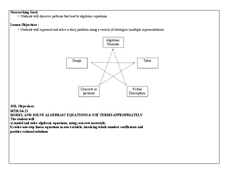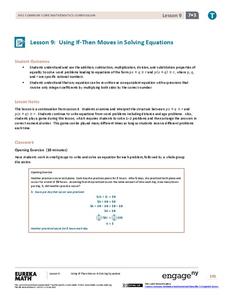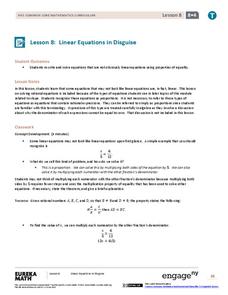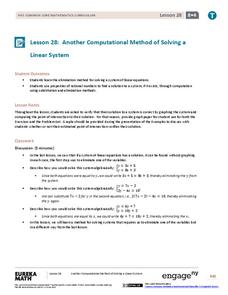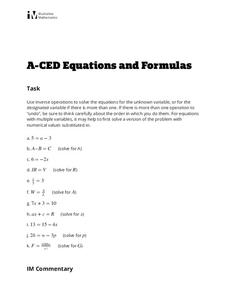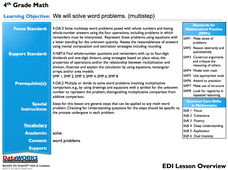Curated OER
Model and Solve Algebraic Equations
Examine multiple ways to solve algebraic equations. Pupils will generate a problem solving strategy that addresses the prompt given by the teacher. They will then share their problem solving strategy with the class. Graphic organizers,...
EngageNY
Using If-Then Moves in Solving Equations
In the eighth activity in a series of 28, math scholars justify the steps of solving algebraic equations. They solve linear equations through an analysis of equality properties, write each equation from a problem situation, and then...
EngageNY
Solving a Linear Equation
Solving an equation is the art of creating simpler equivalent equations using properties of equality. Here, classes see that solving an equation is not always as easy as guessing. The lesson presents linear equations that scholars must...
Alabama Learning Exchange
Can You Solve the Mystery of the Variable?
Solving a murder is like isolating a variable. Using a video on a murder mystery, the narrator introduces the idea of solving a literal equation for one variable. After solving several equations, the class comes up with a set of...
EngageNY
Solving Equations Using Algebra 2
If you use a fabulous lesson plan, then your pupils can become fabulous at solving equations. The 24th installment of 25 incorporates the use of if-then statements to illustrate the properties of equality used in solving two-step linear...
EngageNY
Solving Equations Using Algebra
Use a tape diagram to emulate the steps of solving equations. The 23rd installment in a 25-part unit presents two-step linear equation problems to solve. Pupils use tape diagrams to solve the problems along with linear equations. To...
EngageNY
Comparing Tape Diagram Solutions to Algebraic Solutions
Learners solve vacation equations using tape in a lesson plan that utilizes tape diagrams to aid in understanding the algebraic steps involved in solving two-step linear equations. Groups work together to solve seven scenarios involving...
EngageNY
Angle Problems and Solving Equations II
Demonstrate the application of algebra to geometric angle relationships with an activity that asks learners to use what they know about adjacent and vertical angles to write algebraic equations. Diagrams become more complex in this...
EngageNY
Solving Inequalities
Investigate complex problem situations by applying inequalities. Building from concepts explored in the previous lesson plan, learners read word problems and develop inequalities to represent the situation. They then solve the...
Illustrative Mathematics
Sammy's Chipmunk and Squirrel Observations
Here is a fun project. Sammy observes a chipmunk and a squirrel to see how many holes each needs in order to stash the same number of acorns. Scholars could find the answer algebraically or create a table to analyze the...
EduGAINs
Introduction to Solving Linear Systems
Word problems offer class members an opportunity to learn the concept of solving linear systems using graphs. Individuals choose a problem based upon preferences, break into groups to discuss solution methods and whether there...
EngageNY
Using If-Then Moves in Solving Equations II
Continuing from the previous lesson in the 28-part series, learners write equations to model problem situations. They then solve the problem by applying the properties of equality. In contrast to the previous lesson, they do not write...
EngageNY
Angle Problems and Solving Equations
Learners build connections between algebra and geometry as they study equation solving. The ninth instructional activity in the series of 28 asks pupils to write equations using angle relationships. After writing equations to model...
EngageNY
Solving for Unknown Angles Using Equations III
Challenge your classes to combine geometric and algebraic concepts with an activity that builds on concepts learned in the first three lessons of the series. The fourth part asks scholars to identify geometric angle relationships and use...
Sinclair Community College
Solving Linear Inequalities
Your learners will appreciate the complete picture of linear inequalities presented in this lesson plan. Starting simply with definitions and moving all the way to solving linear inequality word problems this activity is simple to...
EngageNY
Linear Equations in Disguise
In the eighth segment of a 33-part unit, learners look at equations that do not appear to be linear at first glance. The equations are proportions where the numerators and denominators may have more than one term. To round out the...
Math Solutions
Dr. Seuss Comes to Middle School Math Class
If you think Dr. Seuss has no place in a math classroom, then take a look at this resource. Based on the classic children's book Green Eggs and Ham, this sequence of activities engages children learning to model real-world contexts...
West Contra Costa Unified School District
Connecting Graphing and Solving Absolute Value Equations and Functions
Can you solve an equation graphically? Absolutely! This Algebra II lesson makes the connection between solving an absolute value equation and graphing two functions. Graphing absolute value functions is presented through the process of...
EngageNY
Solutions of a Linear Equation
Use the distributive property to solve equations. The sixth lesson in a 33-part series has scholars solve equations that need to be transformed into simpler equations first. Class members apply the distributive property to the equations...
Curated OER
Deciphering Word Problems in Order to Write Equations
Help young mathematicians crack the code of word problems with this three-lesson series on problem solving. Walking students step-by-step through the process of identifying key information, creating algebraic equations, and finally...
EngageNY
Another Computational Model of Solving a Linear System
The process of elimination really works! Use elimination when substitution isn't doing the job. The 29th segment in a series of 33 introduces the elimination method to solving linear systems. Pupils work several exercises to grasp the...
Illustrative Mathematics
Equations and Formulas
Your class is asked to use inverse operations to solve eleven equations for unknown variables or to rearrange formulas to highlight a quantity of interest. By using the same reasoning as solving one- and two-step equations, algebra...
DataWorks
4th Grade Math: Multi-Step Word Problems
Solving word problems requires reading comprehension and math computation. Through an interactive slideshow presentation, fourth graders observe and follow each step toward solve multiplication and division word problems.
EngageNY
Mixture Problems
What percent of the mixture is juice? Pairs use their knowledge of proportions to determine what percent a mixture is juice given the percent of juice in the components. Pupils use the procedure learned with the juice mixture problem to...
